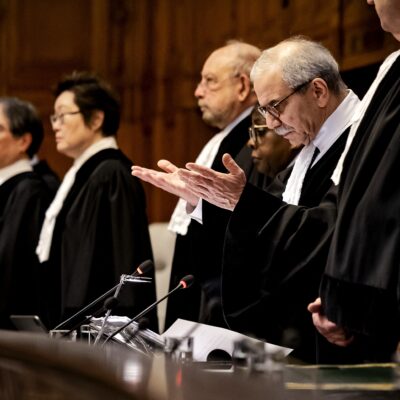Austin defends Israel from ‘genocide’ claims but says Netanyahu must provide more aid
The defense secretary made the comments during his testimony before the Senate Armed Services Committee about the Pentagon’s budget for the upcoming fiscal year

Jeon Heon-Kyun - Pool/Getty Images
Secretary of Defense Lloyd Austin attends a press conference with South Korean Defense Minister Lee Jong-sup (not pictured) at the Defense Ministry on January 31, 2023, in Seoul, South Korea.
Defense Secretary Lloyd Austin testified to Congress on Tuesday that the U.S. does not “have any evidence” that Israel is committing genocide through its war in Gaza while publicly urging Israeli Prime Minister Benjamin Netanyahu to make more humanitarian aid available to Gazans.
Austin made the comments during his nearly three-hour testimony before the Senate Armed Services Committee about the Pentagon’s budget for the upcoming fiscal year, after being asked by Sen. Tom Cotton (R-AR) if he would classify Israel’s military activities in Gaza as “genocide.”
Cotton then asked Austin to respond to far-left criticisms that the administration is greenlighting genocide by standing with Israel, to which the defense secretary replied, “From the very beginning, we committed to help assist Israel in defending its territory and its people by providing security assistance. And I would remind everybody that what happened on Oct. 7 was absolutely horrible.”
Austin was similarly pressed about the term by Sen. Roger Wicker (R-MS), the top Republican on the committee, who asked if what happened on Oct. 7 constituted genocide. Austin declined to answer affirmatively, though he did agree that the attack “certainly” could be classified as a war crime. Other administration officials, including a former Austin subordinate, have said Hamas’ actions could be considered genocide.
Cotton and Austin also sparred over Israel’s responsibility to provide humanitarian assistance to Gaza while the war is still ongoing and whether it is wise for the U.S. to establish a port to help distribute some of that aid. Cotton cautioned that he doesn’t think providing aid to Gaza while under the control of Hamas is “going to end very well,” while Austin argued that the Israelis will “create a lasting effect in terms of stability” if something is done “to help the Palestinian people.”
“I get that, but they’re in the middle of the war. We believed that too after World War II, that’s why we had the Marshall Plan. That’s why we rebuilt Japan. But that was after the war was won, not in the middle of it,” Cotton replied. “In the meantime, it’s not Israel’s responsibility to provide aid. It’s certainly not our responsibility, but we’re spending our tax dollars to build this giant pier to send aid into Gaza. Who’s going to accept that aid? Who’s gonna be at the end of the pier on the shore, taking aid from American forces?”
Austin told Cotton that the specifics are “still being worked out, but there will be NGOs that will help to distribute that aid.”
“Hamas is in charge of Gaza. When aid goes to Gaza, Hamas doesn’t divert it or commandeer it or steal it, it accepts it. And anybody operating in Gaza is under the thumb of Hamas. I just think it’s very ill-considered,” Cotton said.
Austin was also pressed by Democrats on the Pentagon’s efforts to get the port up and running to get aid into Gaza as swiftly as possible, as well as on ways the Biden administration could press Netanyahu to alter his war plan.
Sen. Jack Reed (D-RI), who chairs the Armed Services Committee, asked Austin if the maritime corridor was “a legitimate mission for the United States military” to be engaged in, something the defense secretary answered affirmatively.
“It is something we have the ability to do and we should do,” Austin said of the pier.
“If Israel wants to create lasting effects, then it must address the humanitarian needs of the Palestinian people, and not in a marginal way but in a meaningful way,” Austin added. “So we continue to encourage the Israeli leadership … to increase the volume of humanitarian assistance that is going into [Gaza]. We’ve seen them do that most recently, but we need to sustain that.”
Austin didn’t answer Sen. Angus King’s (I-ME) question about why President Joe Biden didn’t pause the latest arms sale to Israel, something the senator suggested as a method to strongarm the country into taking a more surgical approach to eliminating Hamas. Austin instead pointed to Biden’s recent phone call with Netanyahu, saying it “clearly had an effect, we have seen changes in behavior and we have seen more humanitarian assistance being pushed into Gaza. There needs to be more still, but I think the president’s conversation had a positive effect.”
Austin was also asked by Sen. Elizabeth Warren (D-MA) if Israel’s impending invasion of Rafah, the southern Gazan city where some 1.3 million Palestinians have evacuated, would enhance Israeli or U.S. security. He replied by saying that civilians need to be evacuated from Rafah before Israel invades. “It cannot be going forward what we’ve seen in the past,” he said. “They need to get civilians out of that battle space around Rafah.”
Democrats have been widely opposed to Netanyahu going into Rafah, arguing that it would worsen the humanitarian situation on the ground.
Marc Rod contributed to this report.










